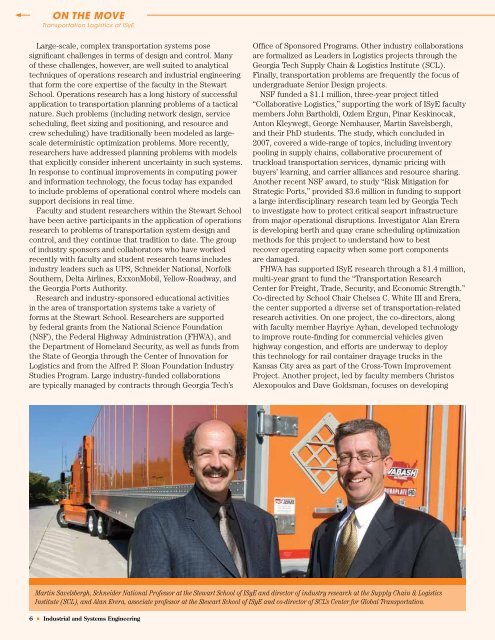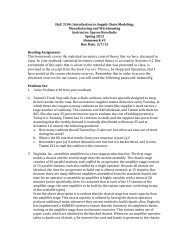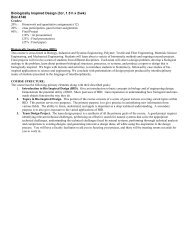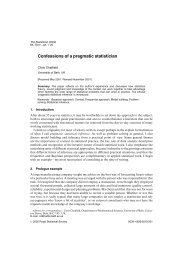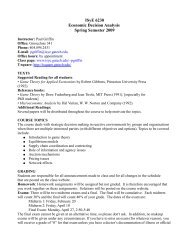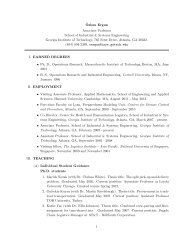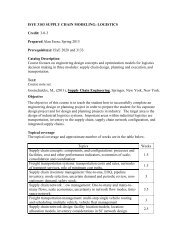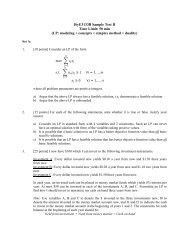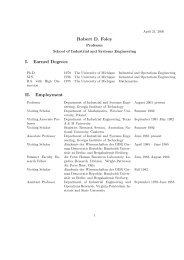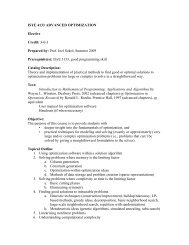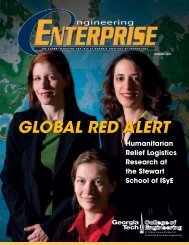Fall 2009 - H. Milton Stewart School of Industrial & Systems ...
Fall 2009 - H. Milton Stewart School of Industrial & Systems ...
Fall 2009 - H. Milton Stewart School of Industrial & Systems ...
You also want an ePaper? Increase the reach of your titles
YUMPU automatically turns print PDFs into web optimized ePapers that Google loves.
ON THE MOVE<br />
Transportation Logistics at ISyE<br />
Large-scale, complex transportation systems pose<br />
significant challenges in terms <strong>of</strong> design and control. Many<br />
<strong>of</strong> these challenges, however, are well suited to analytical<br />
techniques <strong>of</strong> operations research and industrial engineering<br />
that form the core expertise <strong>of</strong> the faculty in the <strong>Stewart</strong><br />
<strong>School</strong>. Operations research has a long history <strong>of</strong> successful<br />
application to transportation planning problems <strong>of</strong> a tactical<br />
nature. Such problems (including network design, service<br />
scheduling, fleet sizing and positioning, and resource and<br />
crew scheduling) have traditionally been modeled as largescale<br />
deterministic optimization problems. More recently,<br />
researchers have addressed planning problems with models<br />
that explicitly consider inherent uncertainty in such systems.<br />
In response to continual improvements in computing power<br />
and information technology, the focus today has expanded<br />
to include problems <strong>of</strong> operational control where models can<br />
support decisions in real time.<br />
Faculty and student researchers within the <strong>Stewart</strong> <strong>School</strong><br />
have been active participants in the application <strong>of</strong> operations<br />
research to problems <strong>of</strong> transportation system design and<br />
control, and they continue that tradition to date. The group<br />
<strong>of</strong> industry sponsors and collaborators who have worked<br />
recently with faculty and student research teams includes<br />
industry leaders such as UPS, Schneider National, Norfolk<br />
Southern, Delta Airlines, ExxonMobil, Yellow-Roadway, and<br />
the Georgia Ports Authority.<br />
Research and industry-sponsored educational activities<br />
in the area <strong>of</strong> transportation systems take a variety <strong>of</strong><br />
forms at the <strong>Stewart</strong> <strong>School</strong>. Researchers are supported<br />
by federal grants from the National Science Foundation<br />
(NSF), the Federal Highway Administration (FHWA), and<br />
the Department <strong>of</strong> Homeland Security, as well as funds from<br />
the State <strong>of</strong> Georgia through the Center <strong>of</strong> Innovation for<br />
Logistics and from the Alfred P. Sloan Foundation Industry<br />
Studies Program. Large industry-funded collaborations<br />
are typically managed by contracts through Georgia Tech’s<br />
Office <strong>of</strong> Sponsored Programs. Other industry collaborations<br />
are formalized as Leaders in Logistics projects through the<br />
Georgia Tech Supply Chain & Logistics Institute (SCL).<br />
Finally, transportation problems are frequently the focus <strong>of</strong><br />
undergraduate Senior Design projects.<br />
NSF funded a $1.1 million, three-year project titled<br />
“Collaborative Logistics,” supporting the work <strong>of</strong> ISyE faculty<br />
members John Bartholdi, Ozlem Ergun, Pinar Keskinocak,<br />
Anton Kleywegt, George Nemhauser, Martin Savelsbergh,<br />
and their PhD students. The study, which concluded in<br />
2007, covered a wide-range <strong>of</strong> topics, including inventory<br />
pooling in supply chains, collaborative procurement <strong>of</strong><br />
truckload transportation services, dynamic pricing with<br />
buyers’ learning, and carrier alliances and resource sharing.<br />
Another recent NSF award, to study “Risk Mitigation for<br />
Strategic Ports,” provided $3.6 million in funding to support<br />
a large interdisciplinary research team led by Georgia Tech<br />
to investigate how to protect critical seaport infrastructure<br />
from major operational disruptions. Investigator Alan Erera<br />
is developing berth and quay crane scheduling optimization<br />
methods for this project to understand how to best<br />
recover operating capacity when some port components<br />
are damaged.<br />
FHWA has supported ISyE research through a $1.4 million,<br />
multi-year grant to fund the “Transportation Research<br />
Center for Freight, Trade, Security, and Economic Strength.”<br />
Co-directed by <strong>School</strong> Chair Chelsea C. White III and Erera,<br />
the center supported a diverse set <strong>of</strong> transportation-related<br />
research activities. On one project, the co-directors, along<br />
with faculty member Hayriye Ayhan, developed technology<br />
to improve route-finding for commercial vehicles given<br />
highway congestion, and efforts are underway to deploy<br />
this technology for rail container drayage trucks in the<br />
Kansas City area as part <strong>of</strong> the Cross-Town Improvement<br />
Project. Another project, led by faculty members Christos<br />
Alexopoulos and Dave Goldsman, focuses on developing<br />
Martin Savelsbergh, Schneider National Pr<strong>of</strong>essor at the <strong>Stewart</strong> <strong>School</strong> <strong>of</strong> ISyE and director <strong>of</strong> industry research at the Supply Chain & Logistics<br />
Institute (SCL), and Alan Erera, associate pr<strong>of</strong>essor at the <strong>Stewart</strong> <strong>School</strong> <strong>of</strong> ISyE and co-director <strong>of</strong> SCL’s Center for Global Transportation.<br />
6 • <strong>Industrial</strong> and <strong>Systems</strong> Engineering


